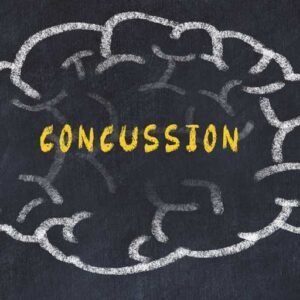
Let’s start from the beginning… What is a concussion? Concussions are a mild form of traumatic brain injury and results from a violent blow or jolt to the head or body. Concussions can affect the brain cells but are typically temporary.
What can cause a concussion?
Common causes of concussion include:
- Falls
- Motor vehicle collisions
- Violence
- Sports injuries
- Explosive blasts or other impact injuries.
Who is at risk?
Individuals most at risk for concussion include:
- Children under the age of 4
- Young adults aged 15-24
- Adults over 60
- Males in any age group.
What are concussion symptoms?
Right now, you are probably asking yourself, “What should I look for if I suspect that I, or someone I know, has a concussion?”
Symptoms of a concussion can include:
- Sensitivity to light or sound
- Foggy or groggy
- Dizziness or balance issues
- Feeling overly tired
- Headaches
- Nausea or vomiting
- Vision changes or problems
- Attention or concentration problems
- Problems with short- or long-term memory
- Trouble thinking clearly
- Anxiety or nervousness
- Irritability
- Overly sad
- Sleeping more or less than usual
- Trouble falling asleep
- Problems with speech
A common occurrence with concussions is loss of consciousness. Loss of consciousness is considered diagnostic when it comes to concussions. This means that, if an individual was struck or jolted and lost consciousness as a result, then they have a concussion. However, you do not have to lose consciousness in order to get a concussion.
How to treat a concussion?
A chiropractor, physical therapist, or other medical professional can aid in the diagnosis and management of a concussion. The first step is always to evaluate. Your medical provider(s) should evaluate your symptoms and establish a baseline so that, moving forward, your progress can be tracked accurately. Once the evaluation has been completed, your provider(s) should establish an individualized treatment strategy for you and your symptoms. After your treatment strategy has been constructed, it is important to ask any questions you may have to ensure that you fully understand your symptoms, your condition, and your treatment strategy.
Once a concussion diagnosis has been made, there are some generally accepted rules of thumb for how to proceed. The first step is to rest after the injury. It is generally accepted that immediately after an injury the individual involved should limit their physical and cognitive activities to avoid causing symptoms to worsen. After a few days, the concussed person should be starting to feel a little better and can begin light exercises such as easy walking. Once the symptoms have nearly resolved, normal activities should be resumed, but if symptoms worsen, take breaks or rest.
Chiropractors and Physical Therapists can help to speed along this process by including more advanced treatment tactics. There is evidence to support tolerable exercise while in the recovery phase after a concussion. Also, any physical complaints you may have such as headaches, neck pain, back pain, dizziness, or vision changes can be addressed to help speed along your recovery.
How long is the concussion recovery time?
Concussions typically resolve in 7-30 days; however, this is not always the case. Concussion symptoms can persist for years after the incident. The term for this is post-concussion syndrome. There are a few theories as to why these symptoms might persist after the normal 7-30 days. One of the best answers to post-concussive symptoms is to address dysfunction within the cervical spine. Cervical spine dysfunction has been related to headaches, dizziness, nausea, visual disturbances, and many of the other symptoms involved with concussion. Addressing the neck could be an answer for those suffering from post-concussive syndrome.
Can my diet affect my concussion?
There has been some early research showing some positive effects of taking omega-3 fatty acids, magnesium, curcumin, resveratrol, creatine, and vitamins C, D, and E. However, researchers are cautious because they do not want anyone, specifically athletes, to think that taking the supplements will prevent them from getting a concussion. Their reason is that they believe athletes would then take greater health risks while participating in sport. The research needs to be looked into further but supplementing your treatment with these substances will not hurt you.
Seize your Health!
Now you have more information about concussions, the symptoms associated with them, and where you can go to attempt to speed up your recovery. If you find yourself suffering from a concussion or from post-concussion syndrome, I urge you to see out your local chiropractor or physical therapist. They may be able to help you find resolution to your symptoms.
References
Ashbaugh, Andrew, et al. “The Role of Nutritional Supplements in Sports Concussion Treatment.” Head, Neck and Spine, 2016; 15:1.
Cheever, Kelly, et al. “Cervical Injury Assessments for Concussion Evaluation: A Review.” Journal of Athletic Training, 2016; 51(12): 1037-1044.
Johnson, C. et al. “Chiropractic and concussion in sport: a narrative review of the literature.” Journal of Chiropractic Medicine, 2013; 12, 216-229.
Marshall, C. et al. “The role of the cervical spine in post-concussion syndrome.” Clinical Focus: Rheumatology, Pain management and Concussion Guidelines Care Report. Phys SportsMed, 2015; Early Online: 1-11.
Willer, S. Barry, et al. “Comparison of Rest to Aerobic Exercise and Placebo-like Treatment of Acute Sport-Related Concussion in Male and Female Adolescents.” Archives of Physical Medicine and Rehabilitation; 2019.
Willer, Barry, et al. “Management of Concussion and Post-Concussion Syndrome.” Current Treatment Options in Neurology, 2006; 8: 415-426.



